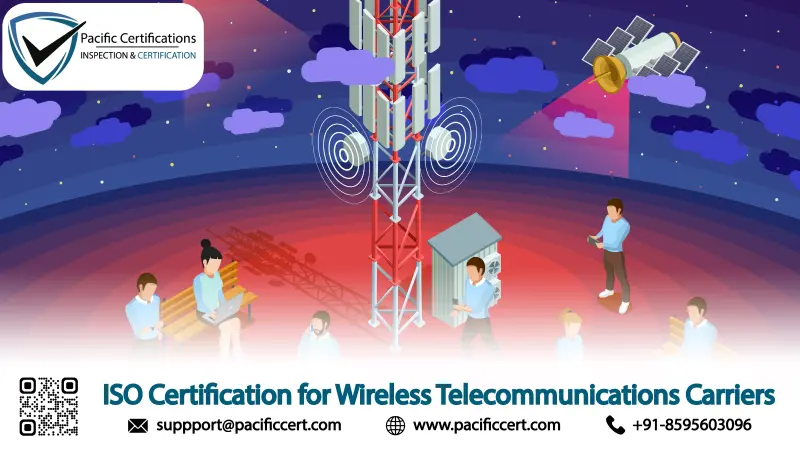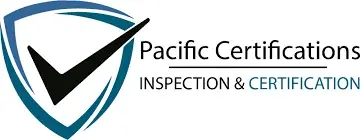ISO Certification for Wireless Telecommunications Carriers and Applicable Standards

ISO certification for Wireless Telecommunications Carriers involves a range of standards that can help ensure quality management, environmental management, information security, and occupational health and safety. While there is no specific ISO standard exclusively for Wireless Telecommunications Carriers, several ISO standards can be applied to enhance the performance, reliability, and safety of services in this sector.
Here are some relevant ISO standards and their applicability:
ISO 9001 - Quality Management System (QMS): This standard provides a framework for quality management and continuous improvement, focusing on customer satisfaction and operational efficiency. Wireless Telecommunications Carriers can use ISO 9001 to ensure high-quality services, effective management processes, and customer satisfaction.
ISO 14001 - Environmental Management System (EMS): ISO 14001 helps organizations minimize their environmental impact. For Wireless Telecommunications Carriers, this could involve strategies for reducing energy consumption, managing waste from electronic equipment, and minimizing the environmental impact of infrastructure development.
ISO 27001 - Information Security Management System (ISMS):Given the sensitivity of data handled by Wireless Telecommunications Carriers, ISO 27001 is crucial. It provides guidelines for information security management, ensuring the confidentiality, integrity, and availability of data.
ISO 45001 - Occupational Health and Safety Management System (OHSMS): This standard is vital for ensuring the safety and well-being of employees, especially those involved in infrastructure maintenance and field operations. It helps in identifying and controlling health and safety risks, reducing potential accidents, aiding legal compliance, and improving overall performance.
ISO/IEC 20000-1 - IT Service Management System (ITSMS): This standard is relevant for the IT aspect of Wireless Telecommunications Carriers. It guides the design, transition, delivery, and improvement of services to meet service requirements and deliver value.
ISO/IEC 27018 - Protection of Personally Identifiable Information (PII) in Public Clouds: This standard is particularly relevant for carriers offering cloud services or using cloud services for data storage and management.
Click here to find out more applicable standards to your industry
For Wireless Telecommunications Carriers looking to implement these ISO standards, it's important to:
Conduct a Gap Analysis: Understand the current state of your processes and how they align with the ISO standards.
Develop a Plan: Create a detailed plan to address the gaps and align your processes with the standard requirements.
Implement Changes: Modify processes, provide training, and implement necessary changes.
Conduct Internal Audits: Regularly audit your processes to ensure compliance and identify areas for improvement.
Choose a Certification Body: Select an accredited certification body like Pacific Certifications for the certification audit.
Pacific Certifications, accredited by ABIS, can assist in the process of obtaining these ISO certifications. We can provide guidance on compliance with the standards, conduct the necessary audits, and issue the certifications upon successful compliance. For assistance, you can contact our team at [email protected].
Requirements & benefits of ISO certification of Wireless Telecommunications Carriers
The requirements and benefits of ISO certification for Wireless Telecommunications Carriers encompass various aspects of business operations, from improving management systems to enhancing customer satisfaction. Here, we'll delve into the key requirements and benefits of ISO certification, particularly focusing on standards like ISO 9001, ISO 14001, ISO 27001, and ISO 45001, which are highly relevant to this sector.
Requirements for ISO Certification
ISO 9001 (Quality Management System) Requirements:
Establish a Quality Management System: Implement documented procedures and processes to manage and control operational activities.
Commitment to Quality: Top management must demonstrate commitment to the QMS, ensuring resources, setting quality objectives, and conducting management reviews.
Customer Focus: Ensure that customer needs and expectations are identified and met.
ISO 14001 (Environmental Management System) Requirements:
Environmental Policy: Develop a policy that commits to environmental protection and sustainable practices.
Compliance with Regulations: Understand and comply with environmental legal requirements.
Continuous Improvement: Establish objectives for reducing environmental impact and regularly review performance.
ISO 27001 (Information Security Management System) Requirements:
Risk Assessment: Identify and assess information security risks.
Security Controls: Implement appropriate security controls to mitigate identified risks.
Management Commitment: Ensure management involvement and commitment to the ISMS.
ISO 45001 (Occupational Health and Safety Management System) Requirements:
Worker Safety and Health Policy: Develop a policy for ensuring worker safety and health.
Hazard Identification and Risk Assessment: Identify and assess occupational health and safety risks.
Legal Compliance: Comply with relevant health and safety legislation.
Benefits of ISO Certification
Enhanced Quality of Services: ISO 9001 helps in establishing a framework for consistently delivering high-quality services, increasing customer satisfaction.
Improved Environmental Performance: Compliance with ISO 14001 encourages better environmental practices, reducing waste and energy consumption.
Increased Information Security: ISO 27001 enhances the security of sensitive data, a critical aspect for carriers handling large volumes of customer information.
Better Health and Safety Management: ISO 45001 ensures a safer workplace, reducing the risk of accidents and improving employee wellbeing.
Market Differentiation: Certification can differentiate a carrier in the market, demonstrating a commitment to quality, security, and sustainability.
Compliance with Regulations: ISO certifications help in complying with legal requirements, reducing the risk of penalties and legal issues.
Operational Efficiency: Implementing ISO standards often leads to streamlined processes and increased operational efficiency.
Enhanced Customer Trust: Certifications build customer trust by demonstrating a commitment to maintaining high standards in service quality and security.
Global Recognition: ISO standards are internationally recognized, aiding in global business endeavors.
For Wireless Telecommunications Carriers, obtaining ISO certifications requires commitment and systematic effort to align their processes with the standards. The benefits, however, justify the effort, as they lead to improved performance, compliance, and competitive advantage. For assistance in obtaining ISO certifications, carriers can reach out to us at Pacific Certifications, which is accredited to issue these certifications and can provide the necessary guidance and support.
Pacific Certifications is accredited by ABIS, in case you need support with ISO certification for your business, please contact us at [email protected] or +91-8595603096.
Contact Us
If you need support with ISO certification in Kuwait, contact us at [email protected].
Read More at: Blogs by Pacific Certifications
